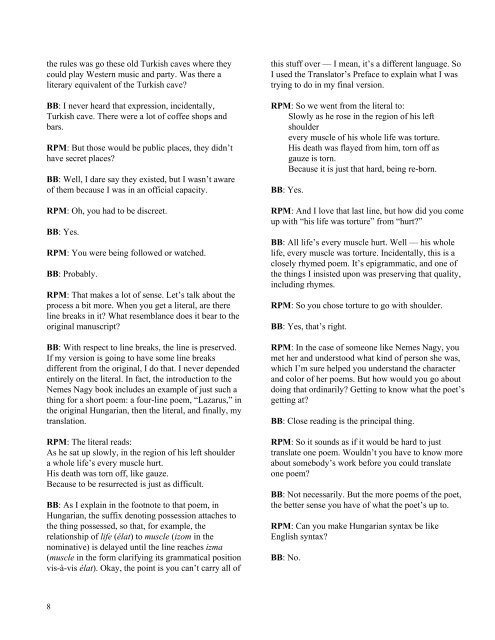their - The University of Texas at Dallas
their - The University of Texas at Dallas
their - The University of Texas at Dallas
Create successful ePaper yourself
Turn your PDF publications into a flip-book with our unique Google optimized e-Paper software.
the rules was go these old Turkish caves where they<br />
could play Western music and party. Was there a<br />
literary equivalent <strong>of</strong> the Turkish cave<br />
BB: I never heard th<strong>at</strong> expression, incidentally,<br />
Turkish cave. <strong>The</strong>re were a lot <strong>of</strong> c<strong>of</strong>fee shops and<br />
bars.<br />
RPM: But those would be public places, they didn’t<br />
have secret places<br />
BB: Well, I dare say they existed, but I wasn’t aware<br />
<strong>of</strong> them because I was in an <strong>of</strong>ficial capacity.<br />
RPM: Oh, you had to be discreet.<br />
BB: Yes.<br />
RPM: You were being followed or w<strong>at</strong>ched.<br />
BB: Probably.<br />
RPM: Th<strong>at</strong> makes a lot <strong>of</strong> sense. Let’s talk about the<br />
process a bit more. When you get a literal, are there<br />
line breaks in it Wh<strong>at</strong> resemblance does it bear to the<br />
original manuscript<br />
BB: With respect to line breaks, the line is preserved.<br />
If my version is going to have some line breaks<br />
different from the original, I do th<strong>at</strong>. I never depended<br />
entirely on the literal. In fact, the introduction to the<br />
Nemes Nagy book includes an example <strong>of</strong> just such a<br />
thing for a short poem: a four-line poem, “Lazarus,” in<br />
the original Hungarian, then the literal, and finally, my<br />
transl<strong>at</strong>ion.<br />
RPM: <strong>The</strong> literal reads:<br />
As he s<strong>at</strong> up slowly, in the region <strong>of</strong> his left shoulder<br />
a whole life’s every muscle hurt.<br />
His de<strong>at</strong>h was torn <strong>of</strong>f, like gauze.<br />
Because to be resurrected is just as difficult.<br />
BB: As I explain in the footnote to th<strong>at</strong> poem, in<br />
Hungarian, the suffix denoting possession <strong>at</strong>taches to<br />
the thing possessed, so th<strong>at</strong>, for example, the<br />
rel<strong>at</strong>ionship <strong>of</strong> life (él<strong>at</strong>) to muscle (izom in the<br />
nomin<strong>at</strong>ive) is delayed until the line reaches izma<br />
(muscle in the form clarifying its gramm<strong>at</strong>ical position<br />
vis-à-vis él<strong>at</strong>). Okay, the point is you can’t carry all <strong>of</strong><br />
this stuff over — I mean, it’s a different language. So<br />
I used the Transl<strong>at</strong>or’s Preface to explain wh<strong>at</strong> I was<br />
trying to do in my final version.<br />
RPM: So we went from the literal to:<br />
Slowly as he rose in the region <strong>of</strong> his left<br />
shoulder<br />
every muscle <strong>of</strong> his whole life was torture.<br />
His de<strong>at</strong>h was flayed from him, torn <strong>of</strong>f as<br />
gauze is torn.<br />
Because it is just th<strong>at</strong> hard, being re-born.<br />
BB: Yes.<br />
RPM: And I love th<strong>at</strong> last line, but how did you come<br />
up with “his life was torture” from “hurt”<br />
BB: All life’s every muscle hurt. Well — his whole<br />
life, every muscle was torture. Incidentally, this is a<br />
closely rhymed poem. It’s epigramm<strong>at</strong>ic, and one <strong>of</strong><br />
the things I insisted upon was preserving th<strong>at</strong> quality,<br />
including rhymes.<br />
RPM: So you chose torture to go with shoulder.<br />
BB: Yes, th<strong>at</strong>’s right.<br />
RPM: In the case <strong>of</strong> someone like Nemes Nagy, you<br />
met her and understood wh<strong>at</strong> kind <strong>of</strong> person she was,<br />
which I’m sure helped you understand the character<br />
and color <strong>of</strong> her poems. But how would you go about<br />
doing th<strong>at</strong> ordinarily Getting to know wh<strong>at</strong> the poet’s<br />
getting <strong>at</strong><br />
BB: Close reading is the principal thing.<br />
RPM: So it sounds as if it would be hard to just<br />
transl<strong>at</strong>e one poem. Wouldn’t you have to know more<br />
about somebody’s work before you could transl<strong>at</strong>e<br />
one poem<br />
BB: Not necessarily. But the more poems <strong>of</strong> the poet,<br />
the better sense you have <strong>of</strong> wh<strong>at</strong> the poet’s up to.<br />
RPM: Can you make Hungarian syntax be like<br />
English syntax<br />
BB: No.<br />
8

















